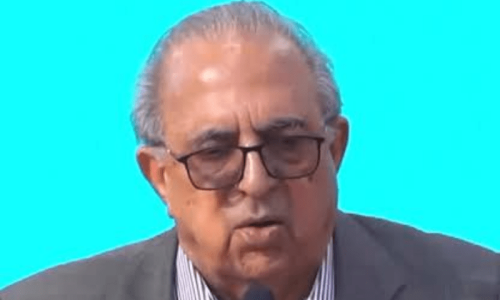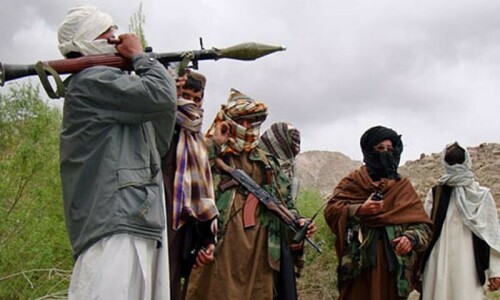REHANKOT: The United Nations says Pakistani charity Jamaatud Dawa is a front for a deadly militant group blamed for a bloody 2008 attack on the Indian city of Mumbai. But to survivors of this week's earthquake, the Islamist aid workers are heroes.
About 2,000 JuD volunteers fanned out across northern Pakistan after Monday's quake, highlighting the organisation's well-oiled disaster response.
JuD's freedom to operate despite US and UN sanctions contrasts sharply with an intensifying crackdown on international aid groups.
It also spotlights Pakistan's alleged reluctance to reign in anti-India militants, a potential flashpoint between the neighbours. India says Pakistan uses militants as proxy forces to attack India, charges that Pakistan denies.
This week, Information Minister Pervez Rashid told media that banned groups would not be allowed to provide aid.
But 50-year-old herbal healer Najib Alam, whose mud-and-stone house was damaged by the 7.5 magnitude quake, says the JuD are the only charity in his mountain village of Rehankot in the Upper Dir region.
"JuD are the only people here," Alam said, the floor of his wrecked home trembling as he pointed out missing chunks of wall.
The village's winding alleys were littered with rubble.
"Maybe those who preach humanitarianism like the US should come here and help us," Alam said.

The United Nations and United States say they sanctioned JuD and its sister organisation, the Falah-i-Insaniat Foundation, because they exploit disasters to raise volunteers and funds for militants.
They claim JuD is a front for Lashkar-i-Taiba (LT) group, which carries out attacks in India-held Kashmir. The Himalayan region is and internationally recognised disputed region, divided between India and Pakistan and claimed by both. Lashkar-i-Taiba was also blamed for the 2008 Mumbai attack in which 166 people were killed.
In three hours after this week's quake, a single Lahore-based JuD worker, Muhammad Zubair, told Reuters he raised 1,000,000 Pakistani rupees (nearly $10,000) for relief supplies. JuD declined to say how much it had raised in total.
JuD members say they are unjustly accused.

"This is propaganda. The UN put sanctions on Jamaat ud Dawa but we were never told what terrorism we do, and neither has anyone ever proven any allegation of terrorism against us," said Abdur Rauf, head of JuD's humanitarian relief operations.
Rauf was designated a "global terrorist" by the United States in 2010.
The JuD has 30,000 volunteers and hundreds of workers, paid between $100 and $200 a month, Rauf and other JuD officials said. It also pays for about 500,000 copies of weekly publications and runs 300 seminaries.
JuD publicly disavows armed militancy. It promotes conservative Islamic rule and calls for Pakistan to retake India-held Kashmir.
On Wednesday, JuD founder Hafiz Saeed, who also led LT before it was sanctioned, issued a statement blaming Pakistan's "un-Islamic" government and "public vulgarity".
After the Mumbai attack, the United States offered $10 million for information leading to Saeed's arrest and conviction.
Crackdown on aid groups
Charities such as JuD are growing in strength as Pakistan cracks down on international aid groups, accusing some of being spies.
The clampdown began after it emerged that the CIA had used a doctor who had contact with an international aid group to hunt for Al Qaeda chief Osama bin Laden, killed in a 2011 raid.
This month, the interior ministry announced plans to vet all international charities. The ministry will cancel registrations of any group carrying out work contrary to the "national interest". Charities say that could be interpreted as anything critical of the government or military.
"The policy ... will worsen the already deteriorating working climate for international humanitarian and human rights groups," said Human Rights Watch.
The government imposes few restrictions on JuD, Rauf said.
"Everyone is co-ordinating and collaborating," he said, referring to his teams, the government and military. Many of the group's medical camps across the region were set up in government hospitals. Photographs show them working alongside the military.
Read: Nawaz-Obama meeting: Agreement to act effectively against all terrorist groups
During Prime Minister Nawaz Sharif's recent visit to the United States, he pledged to crack down on militants, specifically naming Lashkar-i-Taiba in a joint statement with President Barack Obama.
The quake killed 272 Pakistanis and damaged about 25,000 houses, the government said.
Rauf says the JuD is popular because it helps the poor when few wealthy politicians seem to care.
"(Hafiz Saeed) is always among the public, always solving people's problems. We ourselves are from the people, we are from the middle and poor classes. There is no difference between our class and theirs."
Also read: Earthquake toll reaches 248, relief efforts continue















































